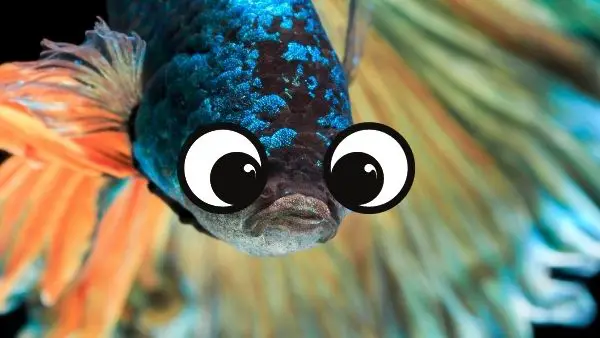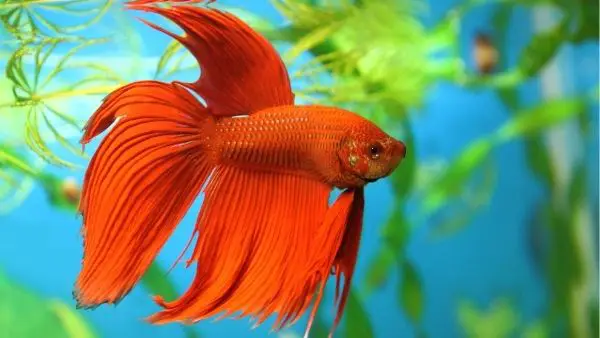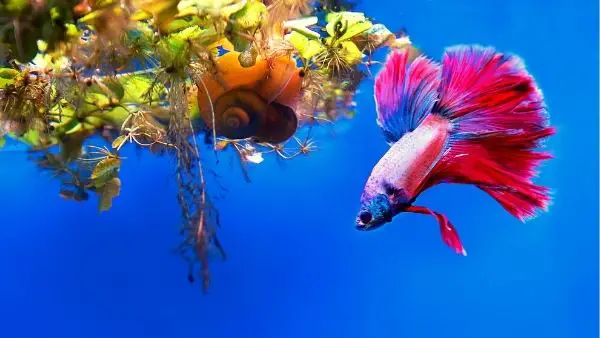Betta fish are majestic and beautiful fish that can encapsulate an audience for hours on end by simply moving slowly around an aquarium. Their coloration and patterns make them truly eye-catching, which is why they are so popular. However, many hobbyists wonder whether betta fish can see in the dark, see their owners, and want to know just how good their vision is in general. Betta fish can see in the dark, but not very well.

Bettas can see a little in the dark, but their night vision is slightly compromised due to their iris functionality being pretty poor. If you wanted to compare the night vision of betta fish with that of humans, bettas are actually a lot worse.
Betta Fish Vision (Overview)
There are many different ways we can look at betta fish vision and there are many questions left unanswered, especially when it comes to them seeing color, long-distance, and even their owners.
Betta fish are active during the day, which is fortunate due to their poor night vision and they tend to sleep and rest during the night.
How Good is Betta Fish Vision?
Betta fish have pretty terrible vision and general eyesight, however, they do have something called monocular vision. Monocular vision allows them to use each eye to see and look at a different thing than the other, like a chameleon.
Something that is another disadvantage for a betta and the quality of their vision is that their depth perception is bad, which you wouldn't expect from monocular vision.
Betta fish have adapted pressure sensors that run along the side of their bodies, which many believe is due to their bad depth perception. They cannot see depth well, but can certainly feel the water pressure, which does the same job via a different method. All in all, betta fish have bad vision.

Can Betta Fish See You?
Betta fish certainly can see you and they will even recognize you if you are feeding them regularly and paying them attention. Obviously, due to their poor vision in the dark they will not see you as well if you are around their tank at that time, but during the day they certainly can see their owners.
Can Betta Fish See Color?
Despite having poor vision, long-distance vision, and pretty terrible depth perception, betta fish have a brilliant ability to see colors well. Bettas have something called diurnal retinas, meaning that their eyes have more cones than they do rods.
Due to this special type of retina it allows them to see color well, apparently even better than humans can - some people are led to believe. Betta fish will still require a lot of light to be able to make the most of their color-seeing abilities.
Are Betta Fish OK in the Dark?
During the day betta fish do not like being in the dark, however, once it becomes nighttime, they will need dark surroundings to sleep and rest. Alternatively, some hobbyists will have a dimmed aquarium blue light on to replicate the moonlight of their natural habitat, but with betta fish, it is best to leave their light completely off to allow them a restful sleep.
Can Betta Fish See Food in the Dark?
No, your betta fish will not be able to identify their food in the dark, which is another good reason why they need to be fed in the daytime, during their normal hunting hours in the wild.
The pressure sensors that have been adapted to help bettas identify what is around them and prevent them from swimming into things may help, but it has not been proven.

Can Betta Fish Sleep in the Dark?
Yes, betta fish certainly do sleep in the dark as they are day hunters and use the dark nighttime for rest and sleep. Betta fish, like most other freshwater fish, need sleep as much as we humans do. Just like us, bettas prefer a dark place to sleep in, which is why it is important to keep their lights off at night to ensure a restful sleep.
Final Thoughts
The main takeaway from this is that betta fish do have pretty poor vision, however, they can see colors very well, they also have pretty unique senses in the form of monocular vision and diurnal retinas.
Additionally, betta fish need sleep and rest as much as we do, so help them achieve this by turning off their aquarium light during the night and any other lights that are on in the room where their tank is located.

